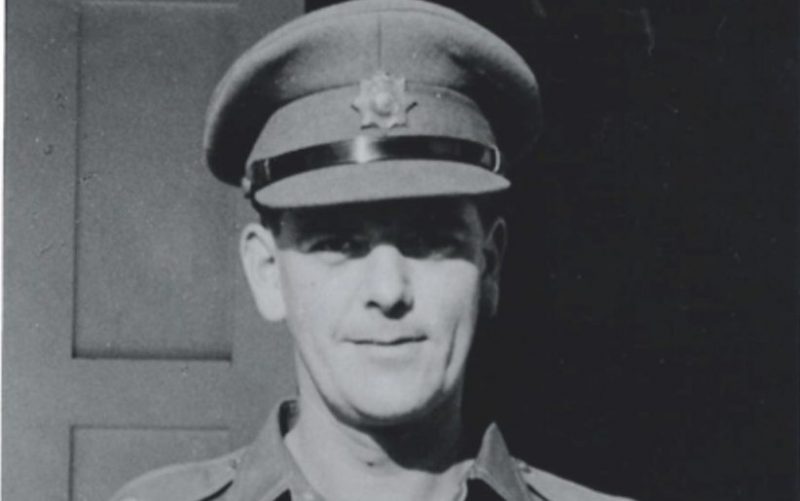Major Jim Symes, a two-time Military Cross recipient, passed away at the age of 96. He received the first of the two honors for an undercover mission during World War II. The second was awarded for anti-terrorist work in Malaya ten years later.
In December 1955, he led a company of 1st Battalion The Royal Hampshire Regiment (1 RHR) at Selangor, Malaya during the Emergency. On December 10, they learned that a group of high-ranking Communist Terrorists (CTs) were in a jungle camp near the village of Ulu Langat, attending a course of political instruction.
Symes took three platoons in four police lorries to the River Langat just before midnight, crossing the river on foot. They brought rations for 24 hours, but left machetes behind since the sound of chopping carries a long way in the jungle. Smoking and radio use were strictly prohibited.
They moved four miles through rubber plantations, then rested. The entire next day was spent looking for a jungle track that their guide was supposed to be able to find. They never found it and ended up spending the night in the rain.
On December 12th, they located the CT camp. Symes spent four hours placing two-and-a-half platoons around the camp and then led the charge on the camp with the half the platoon.
Eleven terrorists were killed, including the communist state committee secretary who had been on the run for years. A large haul of intelligence material, rifles, shotguns, a carbine, a Sten, grenades, and ammunition was gained.
They captured two CTs and only had minor injuries to two of their own. This was one of the most successful operations during the Emergency. Symes received a Bar for his MC. Two NCOs were awarded the Military Medal.
James Michael Symes was born in Guernsey on October 24, 1919. He attended Elizabeth College, where he was captain of the cricket team. Known as Jim, he attended RMC Sandhurst and was commissioned into The Hampshire Regiment (later known as The Royal Hampshire Regiment) in 1939.
At the end of June 1940 Guernsey, demilitarized and undefended, was occupied by the Germans. In September, Symes volunteered to accompany Second Lieutenant Hubert Nicolle on a secret intelligence mission on the island.
Early on September 3, they landed on Petit Port beach. In plain clothes, they made their way inland through a large minefield. They then gathered valuable military information through friends and relatives.
For the next six weeks, they were forced to lie low during attempts to be retrieved by the Royal Navy. Reports that two British Army officers were hiding on the island were received by German authorities and newspaper notices and wall posters appeared, threatening severe reprisals if the two men did not surrender.
In October, the two men did indeed surrender to the Germans. Uniforms had been obtained for them and they presented themselves as soldiers stranded on the island, thereby entitling them to POW status. They were taken to Cherche Midi prison in Paris along with the family and friends that had helped hide them. They were interrogated by the Gestapo, court-martialed, and sentenced to death by firing squad.
Major Fritz Bandelow, the German commander of the occupation forces, overturned the ruling and reprieved Symes and Nicolle.
Over the next four-and-a-half years, Symes was in seven prisoner-of-war camps in France, Poland, and Germany. In March 1945, he was part of a forced march from Oflag IX A/Z at Rotenburg. He was liberated by American forces near Eisleben two weeks later. By this time, he had spent 1,635 days in captivity.
In 1946, he joined the Intelligence Department, Allied Commission, in Vienna as a staff officer after taking a Russian Language course at Cambridge. He became a senior interpreter at the British Exchange Mission to Soviet Forces of Occupation Germany (BRIXMIS). He was based at Potsdam, East Germany.
Eventually, Symes became assistant military attaché at the British Embassy in Prague. The caretaker of the house he lived in spied on him. After Stalin died, Symes received a phone call, and a deep voice said:
“This is the ghost of Stalin speaking.”
The line went dead and he was never troubled again.
In 1964, after a year in Jamaica and two years as a student in the German Staff College, Hamburg, he moved to the Defence Intelligence Staff at the MoD. His final appointments were at Staff HW Allied Forces Northern Europe, Oslo, and at HQ BAOR.
He left the Army in 1970 and for the next ten years he was a Retired Officer based in London. He was a regular church-goer and avid gardener; he followed cricket on the radio and television.
Jim Symes married Rosemary Leyson in 1947. She passed away before him. He is survived by their two daughters.
